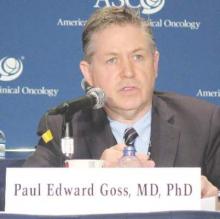CHICAGO – Extending adjuvant aromatase inhibitor (AI) therapy from 5 years to 10 years further reduces the risk of recurrence and new breast cancer in postmenopausal women treated for early disease, according to findings of the MA17.R trial.
In the phase III trial conducted by the Canadian Cancer Trials Group and the North American Breast Cancer Group, 1,918 postmenopausal women who had completed about 5 years of AI therapy (preceded by tamoxifen in the majority of cases) were randomized to take the AI letrozole or to stop therapy by taking placebo for an additional 5 years.
Compared with peers who stopped, women who continued AI therapy for 5 more years had a 34% lower risk of recurrence or contralateral breast cancer, investigators reported in sessions and a press briefing at the annual meeting of the American Society of Clinical Oncology. The trade-off was a small increase in the rates of skeletal adverse events such as fractures; quality of life was essentially unaffected.
“MA17.R is the first study to show the benefit of extending an adjuvant aromatase inhibitor beyond 5 years,” commented lead investigator Paul E. Goss, M.D., director of the Breast Cancer Research Program at the Massachusetts General Hospital and a professor of medicine at Harvard Medical School, both in Boston. “Unlike many anticancer therapies, aromatase inhibitors are readily accessible around the world, and therefore, our results will further improve the outcome of many women with breast cancer.”
The disease-free survival curves will likely separate further, given a “legacy effect” of endocrine therapy that persists after it ends, he predicted. “And I think overall survival will eventually become positive in MA.17R. … The Food and Drug Administration has taken the opinion that overall survival follows disease-free survival like night follows day for endocrine therapies, and I think they are correct, I think that’s what we see in all the trials.”
Implications
It remains unclear how patients should be managed after 10 years of an AI, according to Dr. Goss. “That’s uncharted waters,” he elaborated. “We know from the curve of the natural history of this disease that it chronically relapses, and we continue to see patients 25 years after their primary diagnosis with a recurrence.” Some data in mice suggest there may be benefit from continuing the AI until recurrence. “I don’t think that would be entered into in clinical practice as a rule, because there is no clinical trial of that,” he said. “But this data will now take the aromatase inhibitors out to 10 years.”
The MA.17R trial’s findings show that extended duration of AI therapy is “clinically valuable,” according to ASCO expert Harold J. Burstein, M.D., Ph.D., a senior physician at the Dana-Farber Cancer Institute and an associate professor of medicine at the Harvard Medical School in Boston. He predicted the findings will have at least two consequences.
“One is tremendous interest in longer durations of therapy with the AI, but also some tailoring of treatment based on how the patient has fared with their therapy and on their baseline risk of recurrence. So women who have less risky cancer will probably be less inclined to pursue these longer durations, and women who have higher-risk cancers will be more inclined,” he explained.
Also, “women who have finished 5 years of an AI without any prior tamoxifen I think are going to be very compelled by these data, whereas women who have had 5 years of tamoxifen, 5 years of an AI, and are already 10 years out probably get less benefit numerically from yet longer duration of therapy,” he added. “And we are certainly not at the point of saying that women should be on these drugs for the rest of their lives.”
MA.17R design
Postmenopausal women were eligible for MA.17R if they had undergone resection of hormone receptor–positive early breast cancer and had already completed about 5 years of therapy with any of the three AIs currently on the market. In the large majority of cases, they also had previously received tamoxifen.
Many of the women came from the parent MA.17 trial, which tested an initial 5 years of letrozole (brand name Femara) against placebo after tamoxifen therapy. Longer-term results of that trial, previously reported (J Clin Oncol. 2012;30:718-21), showed that this duration of letrozole had a significant disease-free survival benefit (hazard ratio, .52) and overall survival benefit (HR, .61).
In the MA.17R trial, the women were randomized to letrozole or a placebo for an additional 5 years, with a primary endpoint of disease-free survival and secondary endpoints including safety and quality of life.



